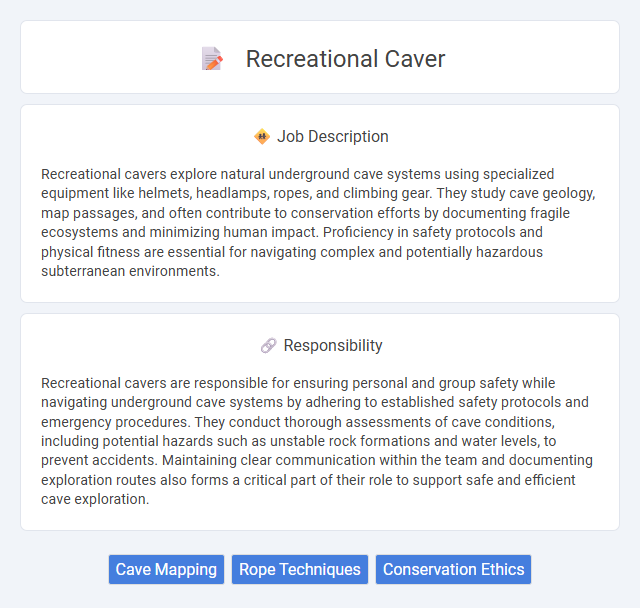
Recreational cavers explore natural underground cave systems using specialized equipment like helmets, headlamps, ropes, and climbing gear. They study cave geology, map passages, and often contribute to conservation efforts by documenting fragile ecosystems and minimizing human impact. Proficiency in safety protocols and physical fitness are essential for navigating complex and potentially hazardous subterranean environments.
Individuals with good physical fitness and a calm mindset are more likely to be suitable for a recreational caver job due to the demanding nature of navigating tight spaces and uneven terrain. Those who may experience claustrophobia, respiratory issues, or lack endurance might find the conditions challenging and less suitable for this activity. Proper training and health assessment could increase the probability of successful participation in recreational caving.
Qualification
Recreational cavers must possess strong physical fitness, exceptional navigation skills, and a thorough understanding of cave safety protocols to ensure secure exploration. Certification in first aid and specialized training in rope techniques or vertical caving are crucial qualifications for managing risks effectively. Experience with mapping technologies and environmental conservation principles enhances their ability to conduct responsible and informed cave expeditions.
Responsibility
Recreational cavers are responsible for ensuring personal and group safety while navigating underground cave systems by adhering to established safety protocols and emergency procedures. They conduct thorough assessments of cave conditions, including potential hazards such as unstable rock formations and water levels, to prevent accidents. Maintaining clear communication within the team and documenting exploration routes also forms a critical part of their role to support safe and efficient cave exploration.
Benefit
Recreational caver jobs likely offer unique physical and mental health benefits due to regular engagement with challenging underground environments. There is a strong probability that this role promotes teamwork and problem-solving skills, enhancing personal development and social interaction. Benefits may also include exposure to natural beauty and opportunities for adventure, contributing to overall job satisfaction and stress reduction.
Challenge
Recreational caving likely presents a significant physical and mental challenge, requiring navigation through tight, dark, and often unpredictable underground passages. Participants probably face varying levels of risk, including potential for falls, getting lost, or encountering unstable surfaces. Success in this role depends heavily on problem-solving skills, adaptability, and a strong sense of spatial awareness.
Career Advancement
Recreational caving offers unique opportunities for career advancement through acquiring specialized skills in cave mapping, safety protocols, and geological assessment, which are highly valued in environmental consulting and adventure tourism industries. Progression often involves gaining certifications in rescue operations and leading guided expeditions, enhancing professional credibility and leadership roles. Continuous participation in scientific research projects and collaboration with professional cave organizations further strengthens career prospects and opens pathways to expert consultant positions.
Key Terms
Cave Mapping
Recreational cavers specializing in cave mapping utilize advanced surveying tools and software to create precise, detailed maps of subterranean environments. These maps contribute significantly to geological studies, help in maintaining safety protocols, and assist researchers in exploring cave formations and ecosystems. Proficiency in topographic data collection, 3D modeling, and spatial analysis is critical for accurate cave documentation and navigation.
Rope Techniques
Recreational cavers rely heavily on advanced rope techniques such as single-rope technique (SRT) for safe vertical navigation in caves. Mastery of knots, rigging anchor points, and efficient ascending and descending methods ensures risk minimization during exploration. Proficiency in rope handling skills is essential for accessing challenging underground passages and conducting rescue operations.
Conservation Ethics
Recreational caving demands strict adherence to conservation ethics, emphasizing minimal impact on fragile cave ecosystems and preservation of geological formations. Cavers must practice Leave No Trace principles, avoid disturbing wildlife habitats, and respect cultural artifacts within caves. Commitment to these ethics ensures sustainable exploration and protection of subterranean environments for future generations.
 kuljobs.com
kuljobs.com